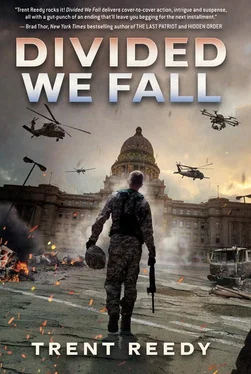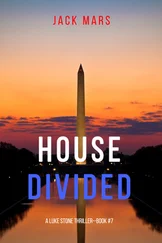“These special forces guys aren’t used to getting stopped by the National Guard.” Sergeant Kemp spoke at nearly a whisper. “They’re pissed.”
“If the Feds were smart, they’d have fast-roped right down onto the roof,” Sergeant Ribbon said.
“Must not have been expecting trouble from Apache gunships and a whole platoon of Guardsmen,” I added.
The captain who had been up in the office with us stepped out in front of the Idaho soldiers. He said something to the Feds, then motioned with a sweeping gesture toward his own men and all their guns. Lastly, he pointed up toward the mansion.
“What’s he doing?” Specialist Stein asked a little too loudly.
Sergeant Ribbon elbowed him. “I think he’s pointing out sniper positions, trying to prove to the Feds that they have no chance.”
“Which they don’t,” said Sparrow.
“I know,” Luchen whispered. “Why don’t they give up already?”
Almost as if they’d heard him, the Fed soldiers lowered their weapons.
General McNabb looked satisfied. “Governor Montaine, I think we’ve stopped this.”
I heard sighs from all over the room.
Montaine closed his eyes and bowed his head a little. “And no one hurt,” he said after a moment.
“Should we bring the federal soldiers in, sir?” asked the general.
“For what? All they’ve done is follow orders. I won’t punish them for that. Allow one helicopter to land and pick them up. Have the Apaches escort them out of Idaho airspace.”
Everyone in the room snapped to life, placing calls, giving orders, working their stations. Outside, one Chinook landed and the squad of federal soldiers that had made it to the ground boarded. The helicopter joined the other Chinook in the sky and then flew off, with the two Apache gunships trailing close behind.
The governor, the general, and their staff continued their flurry of business. Me and my squad sat in the corner out of the way, surfing the wire or watching shows on our comms.
After about an hour, the governor finally seemed to remember we were there. “Gentlemen, I’m sorry, but obviously the situation has changed, and we’re not going to be able to do the nice sit-down meeting like I had hoped. Look for more information on your comms. I’ll have a flight coming to get you soon. Meanwhile, I’ve got this press conference to do down in the entryway in a few minutes. You’re welcome to watch on the screens in here.”
He left the room. A few moments later, the image on one of the larger screens in the office switched to show Governor Montaine stepping up to a podium in front of the stairway. He held up his hand for quiet. “By now, you have all heard the reports about the president’s unlawful and failed attempt to arrest me a short time ago.
“I want to be absolutely clear. My actions today were not motivated by my own self-interest. On the contrary, I have acted so that the will of the residents of Idaho, through its legislature, will not be suppressed by the federal government. I have acted to protect the dutiful soldiers under my command. I could not allow the federal government to arrest me — first because I have done nothing wrong, but more importantly, because to do so would jeopardize or sacrifice the will of the residents of Idaho and the safety and freedom of Idaho soldiers, who are also blameless.
“Today the president contacted me and repeated his demands. I repeated my refusal, and I will say this to the president and to the nation. Any attempt by the federal government to kidnap me or any other elected Idaho official or to detain any innocent soldier of the Idaho National Guard is illegal and will not be tolerated. At this time, I, Governor James Montaine, do hereby invoke Article Fourteen, Section Six of the Constitution of the state of Idaho, which reads, ‘No armed police force, or detective agency, or armed body of men, shall ever be brought into this state for the suppression of domestic violence, except upon the application of the legislature, or the executive, when the legislature can not be convened.’
“That means I will not allow any further armed federal incursions into Idaho with the exception of normal flight operations at Mountain Home Air Force Base southeast of Boise. No armed active duty military personnel from Mountain Home will be allowed to leave the base unless he or she is an off-base resident of Idaho. Any other armed federal agents in the state have twenty-four hours to surrender their weapons or leave.
“I hope that this confrontation is resolved quickly, but make no mistake. We will not be governed by unconstitutional laws, and the soldiers involved in the shootings in Boise will not, under any circumstances, be prosecuted for their actions in stopping the Boise riot. I’m Governor James Montaine, and I stand by my soldiers.”
He motioned to the crowd. “Any questions?” He pointed at someone quickly. “Yeah?”
A blond woman stood up. “Governor, how will you enforce this decree of yours?”
“First of all,” said Montaine, “this isn’t my decree, okay? This isn’t something I just made up. Article Fourteen, Section Six has been a part of Idaho’s constitution since it was first ratified. We have not had a need to enforce this clause until now. Secondly, this will be enforced by any means necessary. Right now, I am working with Idaho law enforcement and the Idaho National Guard to deploy checkpoints at all entries to the state. Idaho airspace is being monitored and will be patrolled by our own air assets. I urge the president and the federal government to take us seriously and respect the law.”
Another reporter flagged his attention. “Governor Montaine, how do you answer critics who would say that by voting for nullification of the ID card law, Idaho is, in effect, seceding from the Union? And aren’t your actions today, coupled with the establishment of these checkpoints, a clear sign that Idaho is a rebel state?”
Montaine pounded his fist on the podium. “That is absolutely untrue! I have been in close counsel with the leadership of the Idaho legislature, and they assure me that both the Idaho house and senate stand with me in opposition to the new federal ID card law. The law is unconstitutional. The Idaho state legislature and I don’t care if the nine people on the US Supreme Court uphold the law or not. It is time we moved past the idea that only the federal government gets to decide whether or not its own actions are constitutional. We ourselves have read the Constitution and studied the issue, and we will not have the federal ID cards in Idaho.” He held up one finger. “And that is only one law. That’s it. One. We’re still obeying constitutional federal laws. We’re still paying federal taxes. Right now, over a thousand Idaho Army National Guardsmen are serving in Iran, fighting to protect America from the threat of an Iranian nuclear weapon. I myself proudly served in the United States Army years ago in Iraq. The people of Idaho are 100 percent American, and in no way does the refusal to implement this one unconstitutional ID card law, or my refusal to allow the federal government to arrest my innocent soldiers, equal the state of Idaho withdrawing from the Union.”
Some of the officers in the room with me cheered. Sergeant Meyers clapped. On the screen, more people called out questions, but I couldn’t take it anymore. I popped in my earbuds, put a country music station on my comm, and waited until the helicopter finally came to take us home.
* * *
It was after two in the afternoon when I pulled up to the shop in the Beast. I sat for a couple minutes in the still quiet after I shut off its rumbling engine. At last, I climbed down out of the truck, hobbling a little bit from the bruises the Pirates had stamped on me last night and the stiffness from that uncomfortable flight.
Читать дальше












